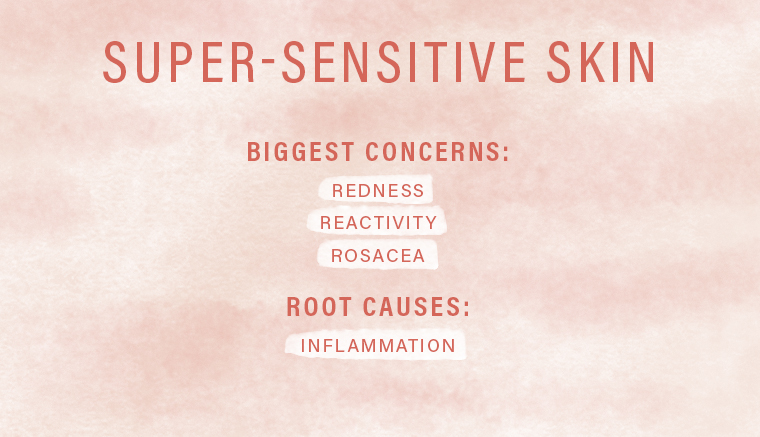When you deal with chronic skin issues, it can sometimes feel like your complexion’s got a personality of its own—one that can't be categorized simply by saying dry, oily, or combination. In fact, naturopathic doctor Trevor Cates claims women's facial problems usually fall under one of five distinct categories—dermatological dispositions, if you will.
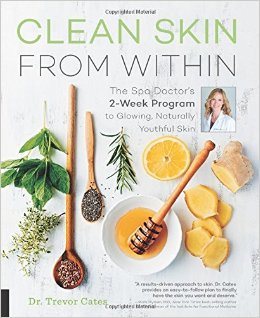 The one thing each type has in common, though, is being linked to internal turmoil (AKA hormonal or nutritional imbalances)—which she explains in her two-week detox guide Clean Skin From Within. “Your skin is like a magic mirror—a device that can offer clues about how healthy your habits are,” Cates says.
The one thing each type has in common, though, is being linked to internal turmoil (AKA hormonal or nutritional imbalances)—which she explains in her two-week detox guide Clean Skin From Within. “Your skin is like a magic mirror—a device that can offer clues about how healthy your habits are,” Cates says.
And since the five sets of symptoms are as complex as cable TV characters, she’s given them each a name. (For example, Olivia is the breakout-prone one, while Amber struggles with dark spots.) Saying you're "definitely a Sage" might not be quite as universally understood as being a Hannah or a Carrie, but Cates' construct is a cute way of dealing with rather dull skin issues.
What's even better, though, is that you don't have to be pigeonholed into any one of these skin-type roles. Cates says, "With the proper assistance, [you] can kick [your] body’s self-healing functions into gear to help resolve those issues.” Because if it’s not on HBO Now, who needs the drama, right?
Keep reading to find out which skin personality you have—and how to treat it from within.
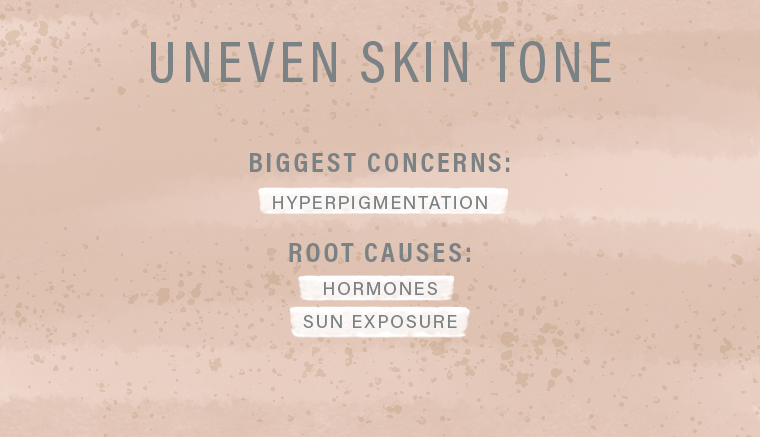
If you've got uneven skin tone, you're an Amber
Biggest concerns: Hyperpigmentation of all sorts—from freckles to larger splotches of melasma.

{{post.sponsorText}}
Root causes: Obviously, sun exposure is Public Enemy No. 1 when it comes to uneven skin tone. But if you’re slathered in SPF 24/7 and still suffer from dark spots, hormones could be to blame. “Melasma's often triggered by pregnancy, birth control pills, and hormone therapy,” says Cates. The stress hormone cortisol can also trigger inflammation, aggravating oxidative skin damage, she adds.
The fix: Wear sunscreen (duh) and keep your hormones in check by managing stress, eating a nutrient-rich diet, getting lots of deep sleep, and exercising on the reg.
If your skin's super sensitive, you're a Heath
Biggest concerns: Redness, reactivity, or rosacea
Root causes: Angry skin is an indication of inflammation on the inside, says Cates. Often, this has to do with a not-so-healthy gut and an overload of stress. But there’s hope: “When you learn to put out those internal flames, you’ll see the skin on your face calm down,” she explains.
The fix: In addition to implementing a microbiome-balancing protocol, you should also make de-stressing a priority. Meditate, do some yoga, take some adaptogens, and—most importantly—go on a skin-care detox.
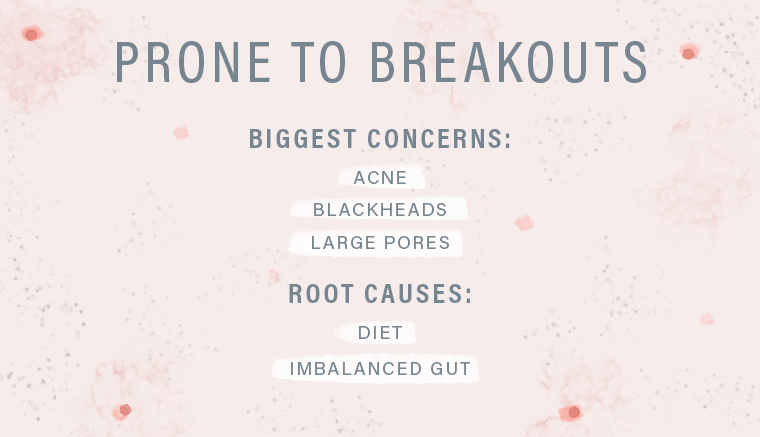
If you're prone to breakouts, you're an Olivia
Biggest concerns: Acne, blackheads, and large pores
Root causes: Hormonal acne is definitely a thing, but Cates claims pimples are largely a result of diet. When your blood sugar’s out of whack (due to too much of the sweet stuff or processed food) and your gut bacteria’s imbalanced, it creates an inflammatory sitch that can beget breakouts.
The fix: “Nutrition is key in treating Olivia types naturally,” says Cates. She recommends cutting excess carbs and sugar, while loading up on probiotics and prebiotics. She also suggests seeking out pH-balancing skin-care products like argan oil. If that’s not enough to calm your spots, Cates says, get yourself to a functional medicine doctor.
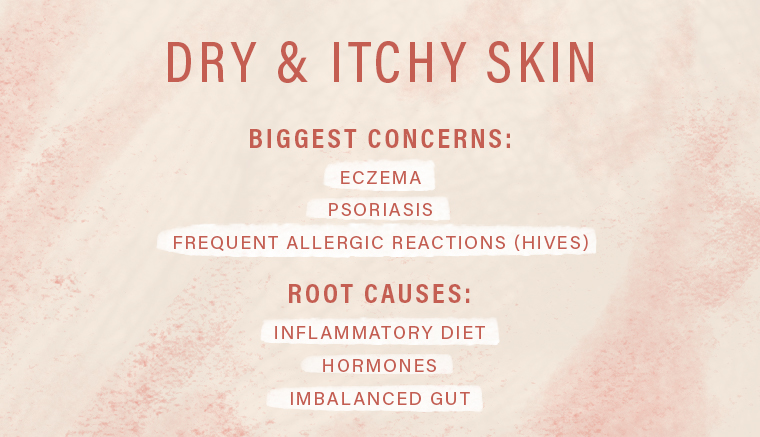
If your skin's dry and itchy, you're an Emmett
Biggest concerns: Eczema, psoriasis, or frequent allergic reactions like hives
Root causes: When your immune system kicks into overdrive, it can cause your skin to revolt, too. This happens for a few reasons, says Cates—sometimes it’s to do with eating inflammatory foods, sometimes it’s hormone-driven, and sometimes it comes back to your microbiome. (Remember, 70 percent of the immune system lives in the gut.)
The fix: Avoid foods that can trigger allergic reactions—including dairy, gluten, eggs, corn, peanuts, and soy—and load up on anti-inflammatory supplements like turmeric, bromelain, and boswellia.
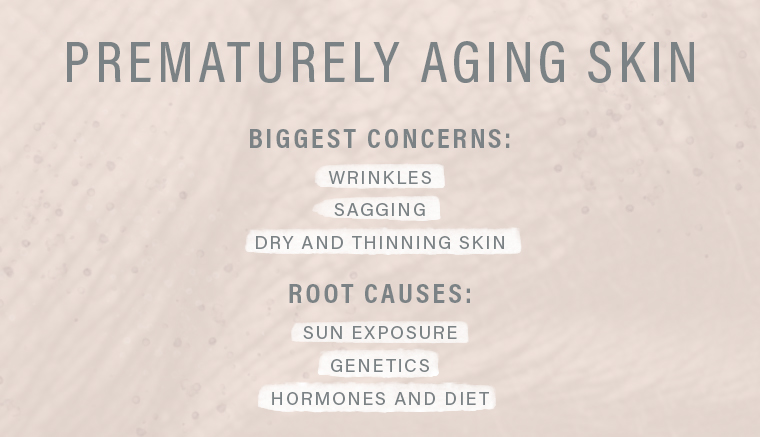
If your skin's aging prematurely, you're a Sage
Biggest concerns: Wrinkles, sagging, dry and thinning skin
Root causes: The usual suspects are still guilty when it comes to accelerated skin aging—namely, sun exposure, genetics, and hormones. But Cates says that diet also plays a surprisingly major hand. “We need key nutrients to maintain healthy skin, and Sage types tend to have nutritional deficiencies,” she says. “[Plus], glycation (from excess sugar intake) makes collagen lose its structure, which then makes skin more prone to wrinkles and sagging.”
The fix: Steer clear of chemicals that can disrupt your hormones, like parabens and phthalates. (They're found in everything from food to bottled water to beauty products.) And make sure you’re getting enough of the key skin nutrients in your diet—omega-3, zinc, probiotics, and vitamins A, B, C, D, and E.
Now that you know your skin type, here are the best foods and supplements to help bring it into balance.
Loading More Posts...
